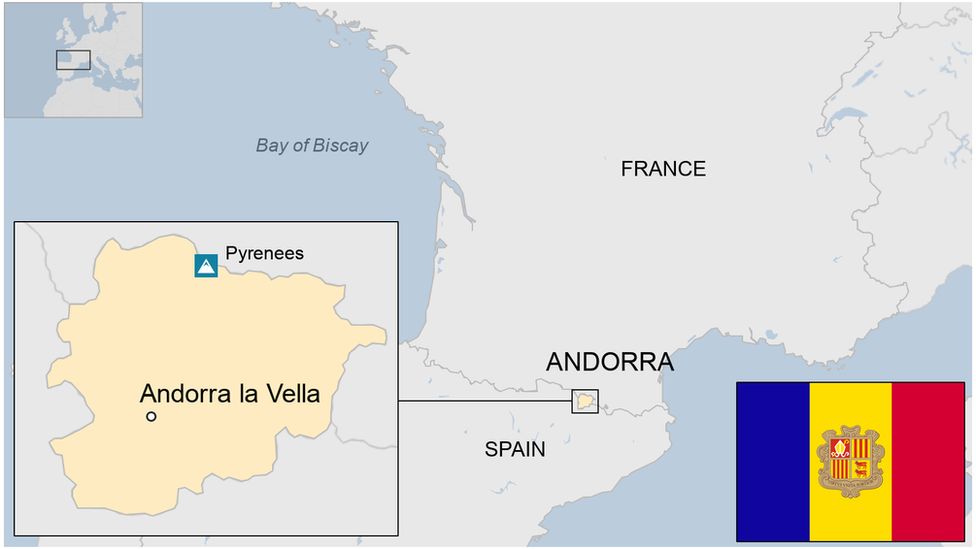Andorra country profile
- Published

The tiny principality of Andorra is located in the high mountains of the Pyrenees between France and Spain.
The mainstay of the highly-prosperous economy is tourism, accounting for about 80% of GDP. An estimated 10 million people visit each year, drawn by winter sports, a warm summer climate and duty-free goods.
The country's banking sector enjoys partial tax-haven status.
For more than 700 years Andorra was ruled jointly by the leader of France and the Spanish bishop of Urgell.
The first Andorran Constitution was passed in 1993, establishing parliamentary government. It then joined the United Nations and Council of Europe.
The French president and the bishop of Urgell are still joint co-princes and heads of state, but the roles are honorary.
Andorra is not a member of the EU, but enjoys a special relationship with it and uses the euro.
- Read more country profiles - Profiles by BBC Monitoring
PRINCIPALITY OF ANDORRA: FACTS
- Capital: Andorra la Vella
- Area: 467 sq km
- Population: 77,500
- Language: Catalan
- Life expectancy: 80 years (men) 84 years (women)
LEADERS
Co-heads of state: The bishop of Urgell, Spain, and president of France
Head of government: Xavier Espot Zamora
Xavier Espot Zamora became prime minister following the April 2019 general elections. He was reelected as prime minister in April 2023.
In recent years the government has instituted many reforms. It legalized political parties and trade unions, and legally guaranteed freedom of religion and assembly.
There has also been a redefinition of the qualifications for Andorran citizenship, a major issue in a country where only a minority of residents are legal citizens.
In July 2022, lawmakers voted unanimously to allow same-sex couples access to civil marriage.
MEDIA
Andorrans have access to broadcasts from both countries, and for many years Andorra was home to Sud Radio, a powerful station broadcasting to southwest France.
There is a public service TV station, TVA, and Radio Nacional d'Andorra operates several radio stations.
- Read full media profile
TIMELINE
Some key dates in the history of Andorra:
AD 803 - Emperor Charlemagne recovers area of present-day Andorra from Moors and is said to grant charter to its residents. After Charlemagne's death Andorra is granted to Spain's Count of Urgell by Charles II, grandson of Charlemagne.
1133 - Count of Urgell cedes Andorra to bishop of Urgell.
1278 - Under terms of "pareage" agreement, Andorra adopts joint allegiance to a French and a Spanish prince after disputes between French heirs to the Urgel countship and the Spanish bishops of Urgell.
1419 - Elected body, Council of the Land, is established to deal with local issues.
1607 - French royal edict establishes French head of state and bishop of Urgell as co-princes.
1936-39 - French troops sent to protect Andorra from spillover from the Spanish Civil War.
1939-45 - Andorra is neutral during the Second World War, becomes important smuggling route from Vichy France into neutral Spain.
1970 - Women given the vote.
1982 - First executive branch of government - "Govern" in Catalan - takes office. Its head is elected by Council of the Land.
1990 - Andorra signs customs union with EU.
1993 - First constitution adopted by referendum. Document reduces feudal powers of two princes. New executive, legislative and judicial arms of government are set up. Andorra joins United Nations. France, Spain establish embassies.
2005 - Cooperation agreement with EU comes into effect.
2009 - Andorra agrees to ease banking secrecy rules to make it easier for other countries to pursue tax evaders and money launderers.
2013 - Andorra introduces personal income tax for the first time as it faces pressure from the European Union to tackle tax evasion.
2016 - Parliament approves plans to end the secrecy of bank accounts held by EU residents
- Published9 January
- Published4 October 2023
- Published21 August 2023
- Published19 May 2023
- Published22 March